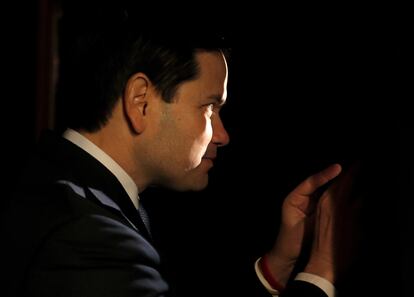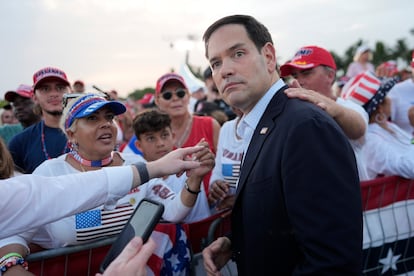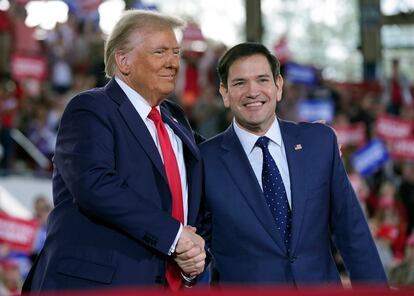From hope to fear of the iron fist: Marco Rubio, an unknown quantity for Cubans
The appointment of the son of Cuban migrants as US Secretary of State will put relations with the Caribbean island at the center of Donald Trump’s agenda


On May 10, 2021, Cuban-American Senator Marco Rubio denounced on the social network X “aggressions and other vile acts” by Cuban agents against art historian Carolina Barrero, one of the young faces of the Cuban opposition, who at that time was attacked, stripped, and accused of contempt at a police station in Havana. The Florida politician then asked a question: “How long will Cuban women have to suffer these abuses?”
Barrero remembers the moment when, lying on a cold, sticky cement bed in a cell at the San Miguel del Padrón prison, a State Security agent approached her to tell her that Senator Marco Rubio was asking for her release. “He said it as through it something very big, even for them,” says Barrero. “I had no idea who Marco Rubio was at the time, only that he was a senator, because the agent had just told me. Then I saw the tweet, which I thanked him for, and I knew that he did that quite often to support Cuban activists.”
It was not the first time that Rubio had spoken out against the abuse of activists and political prisoners on the island. A few years earlier, he raised his voice over the arrest of Ernesto Oliva Torres, an activist of the Patriotic Union of Cuba. “The dictatorship of [Miguel] Díaz-Canel follows the same tactics as the Castro regime, censoring and repressing members of the opposition,” he said. When mass protests broke out on July 11, 2021, he was among the first to launch a hashtag: #SOSCuba. After the demonstrations, when the Havana government turned thousands of citizens into political prisoners, Rubio joined a campaign for the release of imprisoned minors. “As a Cuban-American and as a father, I watch with great pain the injustices that are being committed,” he said in a statement.
In his various statements on the violations of human rights on the island, Rubio has shown himself to be against any policy of rapprochement that, according to him, fills the pockets of the Cuban elite without guaranteeing a radical change of system, even above the price paid by ordinary citizens with each economic sanction. “Any support must be contingent upon genuine democratic changes,” he said a few years ago. “As long as there is no freedom in Cuba, the United States must maintain a firm stance. Every concession made to the Cuban regime is a betrayal of those who are fighting for freedom on the island.”
Now that Rubio will take over as U.S. Secretary of State in the Donald Trump administration on January 20, becoming the first Cuban-American and Latino to hold the high-ranking position, Cubans are debating whether heavy-handed foreign policy will be beneficial or adverse for the island and how it could influence the country’s near future.
“I, personally, always have hope,” says Barrero. “In the darkest moments, that’s when I have the most hope. I have decided to view this scenario as an opportunity. The [Joe] Biden administration did not understand the situation in Cuba. It sought solutions that promoted the whitewashing of the dictatorship, without listening to Cubans, or by listening to a section of Cuban society with economic interests in the island. That took its toll on them,” adds the activist. And, although she says she does not know what the Republicans’ strategy will be at the moment, she hopes that it will involve a “scenario to think about the impossible in the moment of disaster,” and that Rubio will get closer “to the Cuban democratic forces.”
“The important thing is to never forget your roots”
For Eduardo Gamarra, a professor of political science at Florida International University (FIU), Rubio’s appointment to head the State Department, over other names that were mentioned such as former director of national intelligence Rick Grenell, or Senator Bill Hagerty, is “significant.” “He is a well-prepared person and someone whose understanding of foreign policy is informed by academic studies,” says the professor, who is a colleague of Rubio’s in the Department of Political Science at FIU, where the senator has taught for the past two decades. “Both liberal and conservative students value his teaching and enjoy being able to take classes with a senator,” he adds.
Rubio is not the first person of Cuban origin to serve in a U.S. presidential cabinet. Other senators who have done so include Alejandro Mayorkas, who was born in Havana and was Biden’s Secretary of Homeland Security; Mel Martínez and Carlos Gutiérrez, Secretaries of Housing and Urban Development and Commerce, respectively, during the presidency of George W. Bush; and Alexander Acosta, of Cuban roots who was Secretary of Labor in the Trump administration.
The son of Cuban immigrants, Rubio, 53, speaks perfect Spanish and has represented in the Senate a community that on November 5 largely supported Donald Trump. Many Cubans see in him the son of a hotel housekeeper and a waiter who has gone almost as far as one can go in American politics. Rubio, for his part, highlights these two characteristics every time he has the opportunity: his Cuban roots and his status as the son of exiles.

He even refuted an investigation that questioned whether his parents fled Castro’s Cuba, because they actually left the country under Fulgencio Batista in 1956 and not after the triumph of the Revolution in 1959. Rubio then explained that his parents had tried to return, but could not. “In 1961, my mother and older siblings did in fact return to Cuba while my father stayed behind wrapping up the family’s matters in the U.S. After just a few weeks living there, she fully realized the true nature of the direction Castro was taking Cuba and returned to the United States one month later, never to return,” he said in a statement.
There is no record of Rubio having visited the island, or walking the streets where his parents grew up, but he was born and raised in Miami, Florida, the city with the second-largest Cuban population after Havana, and that is enough for many to see him as an equal and to believe that he will keep them safe. “Without a doubt, seeing a first-generation Hispanic American, with working-class roots, reach the heights of power in the United States as the senator has achieved is not only a source of pride for many of us in the Latino community, but also serves as an inspiration for anyone who emigrates to this country in search of a better life,” says Ricardo “Ric” Herrero, executive director of the Cuba Study Group. “The important thing for his success is that he never forgets his roots,” he adds.
In Gamarra’s view, Rubio’s appointment “could serve as an inspiration for many Latinos.” But he clarifies that his political positions do not always reflect the concerns of that group. “His conservative approach and strict policies on issues such as immigration may not align with the expectations of broad sectors of the community,” he says.
What could come: more economic and diplomatic restrictions
Rubio fits the bill of the conservative playbook. In 2013, he appeared on the cover of Time magazine as “The Republican savior.” He has had a meteoric political career, is Catholic, a defender of the traditional family — like the one he has created with his four children and his wife Jeannette Dousdebes, a former bank teller and cheerleader for the Miami Dolphins — and has everything Trump seeks from his team: loyalty and nationalism.
Despite having once faced Trump himself — who nicknamed him “little Marco” when they squared off in the 2016 presidential primaries — Rubio has proven himself a loyal and tough-minded Republican. When he announced that he would join his administration in the post of Secretary of State, the president-elect said that Rubio will be “a fearless warrior” and “a very powerful voice for freedom,” qualities that are celebrated by the Cubans who support him.
On the day his appointment was confirmed, Cuban-American congresswoman María Elvira Salazar wrote on X that it was a “bad day to be a dictator in Latin America.” “The days of their dictatorships are numbered,” added Salazar, warning that Miguel Díaz-Canel, Nicolás Maduro, and Daniel Ortega would have nightmares with Rubio as Secretary of State. The Florida senator has never hidden his radical stance against these governments, especially in Cuba. A hardening of U.S. foreign policy toward the island is expected, which became more hostile after Trump dismantled the reestablishment of diplomatic relations promoted by Barack Obama. And although Biden reversed some of those measures, the time for a thaw is still a long way off.
Rubio was, in fact, one of the most critical voices of Obama’s rapprochement in 2014, which he called “inexplicable.” During Trump’s first term, he was a great defender of the economic strangulation of the Cuban government and advised the former president’s team to implement more than 200 sanctions against Havana, which included travel bans, sanctions on military companies, the sending of remittances, and the inclusion of Cuba once again on the list of countries sponsoring terrorism. In addition, after the alleged sonic attacks on diplomats in Havana, he supported the withdrawal of diplomatic personnel from the embassy. Later, with Biden in power, Rubio warned against executing “Obama’s concessions” again. The senator has blamed the Castro leadership for the economic embargo against the island that the U.S. government declared in 1962, and has said that it will only end in a context of “free, fair, and multiparty elections, civil liberties, the right to own and enjoy private property, and an independent judiciary.”

Gamarra has no doubt that U.S. policy toward Cuba under Rubio “will likely be characterized by a more confrontational stance, with less room for dialogue and cooperation.” And, amid the economic crisis the island is going through, the hardest hit could be ordinary citizens, who are already dealing with shortages of food, medicine, and basic resources. “This could translate into greater economic and diplomatic restrictions toward Cuba, affecting both the government and the general population. One way to view this impact is that the most vulnerable sectors of Cuban society could be the most harmed by an increase in sanctions, since these usually impact the economy and access to essential goods and services,” says the FIU professor.
Herrero, of the Cuba Study Group, notes that Rubio has also “recognized the importance of supporting the people as a political imperative” and of strengthening the island’s civil society and private sector. He also says that, as Secretary of State, he will be well positioned to ensure that any likely new sanctions minimize the impact on the population. “We have seen great innovations in recent years in the design of sanctions so that they are strategically targeted at individuals, groups, and institutions, rather than at populations at large,” he notes.
The future of immigration under Rubio's influence
Where there seems to be less consensus among analysts is to what extent Rubio could influence the potential reversal of immigration policies that in recent years have affected the legal guarantees of Cuban migrants in the United States. In an interview with Univisión, the senator said that the influx of thousands of emigrants “is not sustainable” and that there cannot be “an incentive for people” to emigrate.
Immigration policy decisions are the responsibility of the Department of Homeland Security, so Rubio will not have direct oversight over its formulation or implementation, but Ricardo Herrero believes that, as Secretary of State, he will be able to exert influence over it. “It will be interesting to see how the Trump administration balances its immigration priorities with the interests of the Cuban-American community, one of its most loyal voting blocs,” he says. “Programs like humanitarian parole and family reunification are extremely popular in South Florida, and South Florida Republican representatives have always supported paths to citizenship for Cuban immigrants,” he says.
But Gamarra notes that Rubio has opposed programs like humanitarian parole, and that when former president Obama ended the wet foot/dry foot policy, under which the United States welcomed virtually every Cuban who reached U.S. territory for more than 20 years, Rubio applauded the decision. “It is likely that, as Secretary of State, he will maintain or even reinforce these positions, promoting more restrictive policies regarding immigration from Cuba and other countries. This could make it more difficult to access programs that facilitate the legal entry of immigrants and refugees.”
What analysts have no doubt about is that, with a Cuban on its team, the Trump administration will have Cuba on its agenda of priorities, which was not the case with Biden. For Herrero, the current president, “despite implementing important measures to reopen travel, remittances, and consular services, largely neglected the Caribbean island.” The analyst believes that as of January 20, the White House will focus mainly on immigration policy and the ongoing conflicts in Eastern Europe and the Middle East. But, he adds, “having Rubio at the head of the State Department practically guarantees that Cuba will receive unique attention.”
Sign up for our weekly newsletter to get more English-language news coverage from EL PAÍS USA Edition
Tu suscripción se está usando en otro dispositivo
¿Quieres añadir otro usuario a tu suscripción?
Si continúas leyendo en este dispositivo, no se podrá leer en el otro.
FlechaTu suscripción se está usando en otro dispositivo y solo puedes acceder a EL PAÍS desde un dispositivo a la vez.
Si quieres compartir tu cuenta, cambia tu suscripción a la modalidad Premium, así podrás añadir otro usuario. Cada uno accederá con su propia cuenta de email, lo que os permitirá personalizar vuestra experiencia en EL PAÍS.
¿Tienes una suscripción de empresa? Accede aquí para contratar más cuentas.
En el caso de no saber quién está usando tu cuenta, te recomendamos cambiar tu contraseña aquí.
Si decides continuar compartiendo tu cuenta, este mensaje se mostrará en tu dispositivo y en el de la otra persona que está usando tu cuenta de forma indefinida, afectando a tu experiencia de lectura. Puedes consultar aquí los términos y condiciones de la suscripción digital.








































